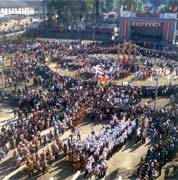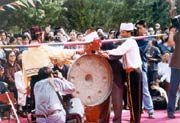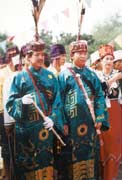| Happiness of "Munao Zongge"
 Munao is from Jingpo language while Zongge comes from Zaiwa language. It is usually written as "Munao Zongge", which means "dancing in mass". It is one of the grandest and largest festival ceremonies. In history, "Munao Zongge" is held in occasions of setting out for battle, returning in victory, good harvest, wedding and funeral, welcoming honorable guests. As to the origin, there are different legends. One popular tale is like this. Long long ago, The Jingpo people lived a peaceful and happy life. But there came out a devil, who fed on little children. One day, having no child to eat, he called wind and rain to form a flood, which drowned fields and houses. A man named Leipan led the countrymen to move to Mailikai River and Enmeikai River, and they built their new homes there. The devil got to know this, chased them to the place and devoured Leipan's son. Therefore Leipan is determined to fight the devil to death. The god of sun was so moved that he made a sword for the man. At last the devil was killed. People held celebrations, singing and dancing. Since then, whenever there are important events, The Jingpo people hold singing and dancing gatherings and call it "Munao", in order to commemorate the glorious deed of their ancestor's slaughtering the devil. Munao is from Jingpo language while Zongge comes from Zaiwa language. It is usually written as "Munao Zongge", which means "dancing in mass". It is one of the grandest and largest festival ceremonies. In history, "Munao Zongge" is held in occasions of setting out for battle, returning in victory, good harvest, wedding and funeral, welcoming honorable guests. As to the origin, there are different legends. One popular tale is like this. Long long ago, The Jingpo people lived a peaceful and happy life. But there came out a devil, who fed on little children. One day, having no child to eat, he called wind and rain to form a flood, which drowned fields and houses. A man named Leipan led the countrymen to move to Mailikai River and Enmeikai River, and they built their new homes there. The devil got to know this, chased them to the place and devoured Leipan's son. Therefore Leipan is determined to fight the devil to death. The god of sun was so moved that he made a sword for the man. At last the devil was killed. People held celebrations, singing and dancing. Since then, whenever there are important events, The Jingpo people hold singing and dancing gatherings and call it "Munao", in order to commemorate the glorious deed of their ancestor's slaughtering the devil.
 
 The main activities of Munao usually last for 3 days. All the Jingpo people, including the young and the old, pour into the Munao square and dance happily day and night. In the centre of the square are 4 about 20 meters high Munao pillars. On the pillar are various kinds of patterns: common brakes, broad swords, triangles, etc., which are symbols of luck, happiness, comity and bravery. There is a square stage on the left side of the pillars, for music players. A 2-metres-long drum and one or several one-meter-diameter mang gongs are hung on the pillars. Around the square is a bamboo fence with tow doors, preventing "wild ghosts" and the cattle from entering the square. When the festival is started, cannon salutes roar above the loud music sound. People gladly offer wine and exchange gifts with each other. Two reverential old men wear loose dragon robes and the Munao hats decorated with teeth of wild boars and feathers of peacocks and pheasants, holding shining broad swords in their hands. Under their leading, people dance according to the patterns and lines on the pillars. After two circles they are divided into two groups. One still dance after the leaders according to the pre-assigned route, while the other group are led by persons of high skills to dance in a freer way. On the third when it is going to over, all the dancers are dancing with various kinds of flowers in their hands. Those in charge of cooking hold pots and scoops in their hands while those in charge of wine take wine barrels in their arms - all dancing gladly. The atmosphere of happiness and joys has reached the climax. The main activities of Munao usually last for 3 days. All the Jingpo people, including the young and the old, pour into the Munao square and dance happily day and night. In the centre of the square are 4 about 20 meters high Munao pillars. On the pillar are various kinds of patterns: common brakes, broad swords, triangles, etc., which are symbols of luck, happiness, comity and bravery. There is a square stage on the left side of the pillars, for music players. A 2-metres-long drum and one or several one-meter-diameter mang gongs are hung on the pillars. Around the square is a bamboo fence with tow doors, preventing "wild ghosts" and the cattle from entering the square. When the festival is started, cannon salutes roar above the loud music sound. People gladly offer wine and exchange gifts with each other. Two reverential old men wear loose dragon robes and the Munao hats decorated with teeth of wild boars and feathers of peacocks and pheasants, holding shining broad swords in their hands. Under their leading, people dance according to the patterns and lines on the pillars. After two circles they are divided into two groups. One still dance after the leaders according to the pre-assigned route, while the other group are led by persons of high skills to dance in a freer way. On the third when it is going to over, all the dancers are dancing with various kinds of flowers in their hands. Those in charge of cooking hold pots and scoops in their hands while those in charge of wine take wine barrels in their arms - all dancing gladly. The atmosphere of happiness and joys has reached the climax.
Munao used to be held by the government, and of a strong religious color. After the founding of the PRC, it has become a festival of all the Jingpo people. Both the contents and the forms have changed. For instance, apart from traditional Munao singing and dancing, there are a variety of entertaining performances, books, local products and everyday merchandise.
Free Courting and Adventurous Wedding Ceremonies <<
Singing and Dancing to Mourn the Dead. >>
|